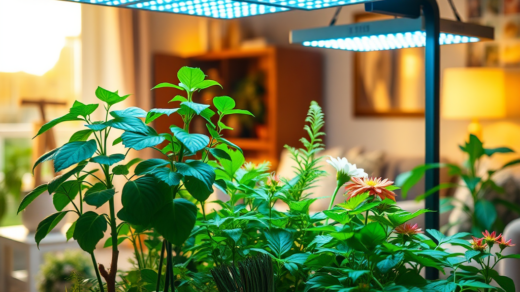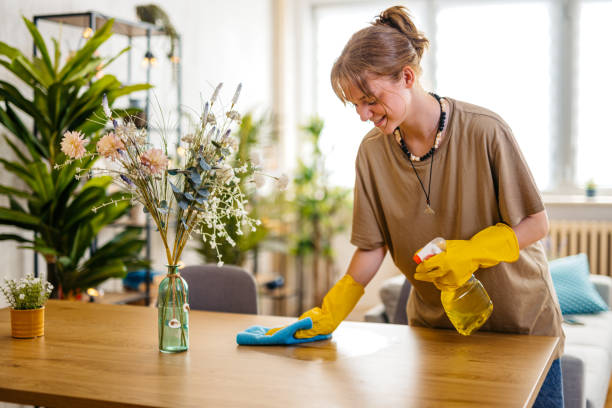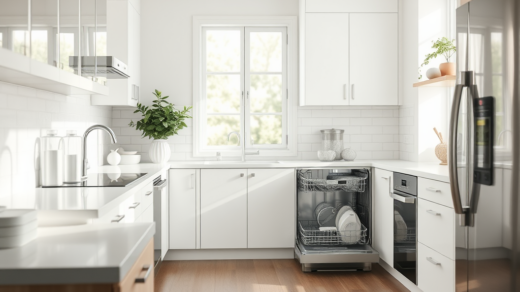Hardwood floors are a beautiful and timeless addition to any home. However, their maintenance can often raise concerns about the use of harsh chemicals. Fortunately, there are effective ways to clean hardwood floors without using chemical-laden products, preserving their elegance without compromising your indoor environment. In this article, we will explore natural cleaning methods that are as gentle as they are effective.
Understanding the Importance of Natural Cleaning

Cleaning hardwood floors naturally is crucial for several reasons. First, it protects the wood itself by preventing potential damage from harsh chemicals that can strip the finish or alter the color. Moreover, using natural products ensures a safer environment, especially for households with children or pets who play on the floor. Lastly, it enhances indoor air quality, as harsh cleaning agents often release volatile organic compounds (VOCs). Embracing natural cleaning methods, therefore, benefits both your floors and your family’s health.
The Basic Supplies You’ll Need

To clean hardwood floors without chemicals, you don’t need a lengthy list of supplies. In fact, simplicity is key. Most essential items are readily available in your kitchen pantry. Here’s a basic list of what you’ll need:
- Microfiber mop or cloth
- White vinegar
- Olive oil or another natural oil
- Lemon juice
- Water
- Baking soda
Each of these items plays a significant role in maintaining clean and shiny hardwood floors by tackling dirt and grime without the need for commercial cleaners.
Step-by-Step Guide to Natural Cleaning
Achieving clean, sparkling hardwood floors naturally involves several straightforward steps. Follow this guide to ensure a thorough cleaning process:
- Start by sweeping or vacuuming the floor to remove dust and debris. Ensuring the surface is dirt-free is crucial before introducing any liquids.
- Mix 1/2 cup of white vinegar with 1 gallon of warm water. This natural solution is perfect for mopping as vinegar gently breaks down the dirt while sanitizing the surface.
- Immerse your microfiber mop into the vinegar solution, wring it out thoroughly to ensure it’s damp, not soaking, and begin mopping the floor in the direction of the wood grain.
- If there are areas with stubborn dirt, sprinkle a small amount of baking soda and gently scrub with a microfiber cloth.
- To restore shine, mix two parts of olive oil with one part lemon juice, and apply sparingly with a clean cloth, polishing the floor in circular motions.
Following these steps will help maintain the natural beauty of your hardwood floors, leaving them clean and lustrous without resorting to chemicals.
Regular Maintenance for Long-lasting Results
To keep your hardwood floors looking their best, regular maintenance is key. Incorporate simple habits into your cleaning routine to ensure long-lasting results. Begin by placing doormats at entrance points to reduce the amount of dirt tracked indoors. Avoid wearing high-heeled shoes on your hardwood floors as they can cause dents. Additionally, consider implementing a no-shoes policy to further minimize debris.
Regular dusting with a microfiber mop will help prevent abrasive particles from scratching the surface. Immediately wipe up any spills using a damp cloth to prevent liquids from seeping into the wood and causing warping. By establishing these preventive measures, you preserve your floors’ integrity and minimize the need for more intensive cleaning efforts.
Conclusion
Cleaning hardwood floors without chemicals is both an environmentally friendly and effective approach to floor care. By embracing simple, natural methods, you ensure the beauty and longevity of your floors and create a safer home environment. From using vinegar and water to olive oil and lemon juice, these natural solutions prove that harsh commercial cleaners are unnecessary for achieving gleaming hardwood. With consistent cleaning and mindful maintenance, your hardwood floors will remain a stunning feature in your home for years to come.
Frequently Asked Questions
1. Can I use vinegar on all types of hardwood floors?
While vinegar is generally safe for most finished hardwood floors, it’s advised to perform a spot test first. Some finishes may react differently to acidic solutions. Always ensure the vinegar solution is well-diluted.
2. How often should I clean my hardwood floors naturally?
Regular light cleaning, such as dusting, can be done weekly. More thorough cleaning using the vinegar solution should be performed monthly or as needed, depending on foot traffic and dirt levels.
3. Can I use essential oils for fragrance when cleaning hardwood floors?
Essential oils can be added for a pleasant fragrance, but use them sparingly. A few drops mixed with your cleaning solution can refresh your home without overwhelming the senses.
4. Is baking soda safe for all hardwood floors?
Baking soda is generally safe in small amounts for tackling specific stains. However, use it cautiously and always test it on a small, inconspicuous area first to ensure it doesn’t scratch the finish.
5. What should I avoid when cleaning hardwood floors naturally?
Avoid using excessive water, as moisture can cause wood to warp. Also, steer clear of steam mops and very abrasive materials that could scratch the wood’s surface.


